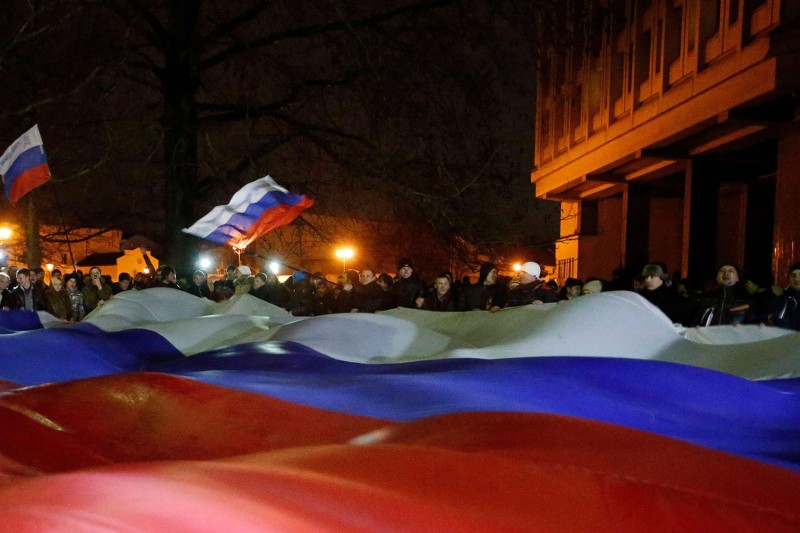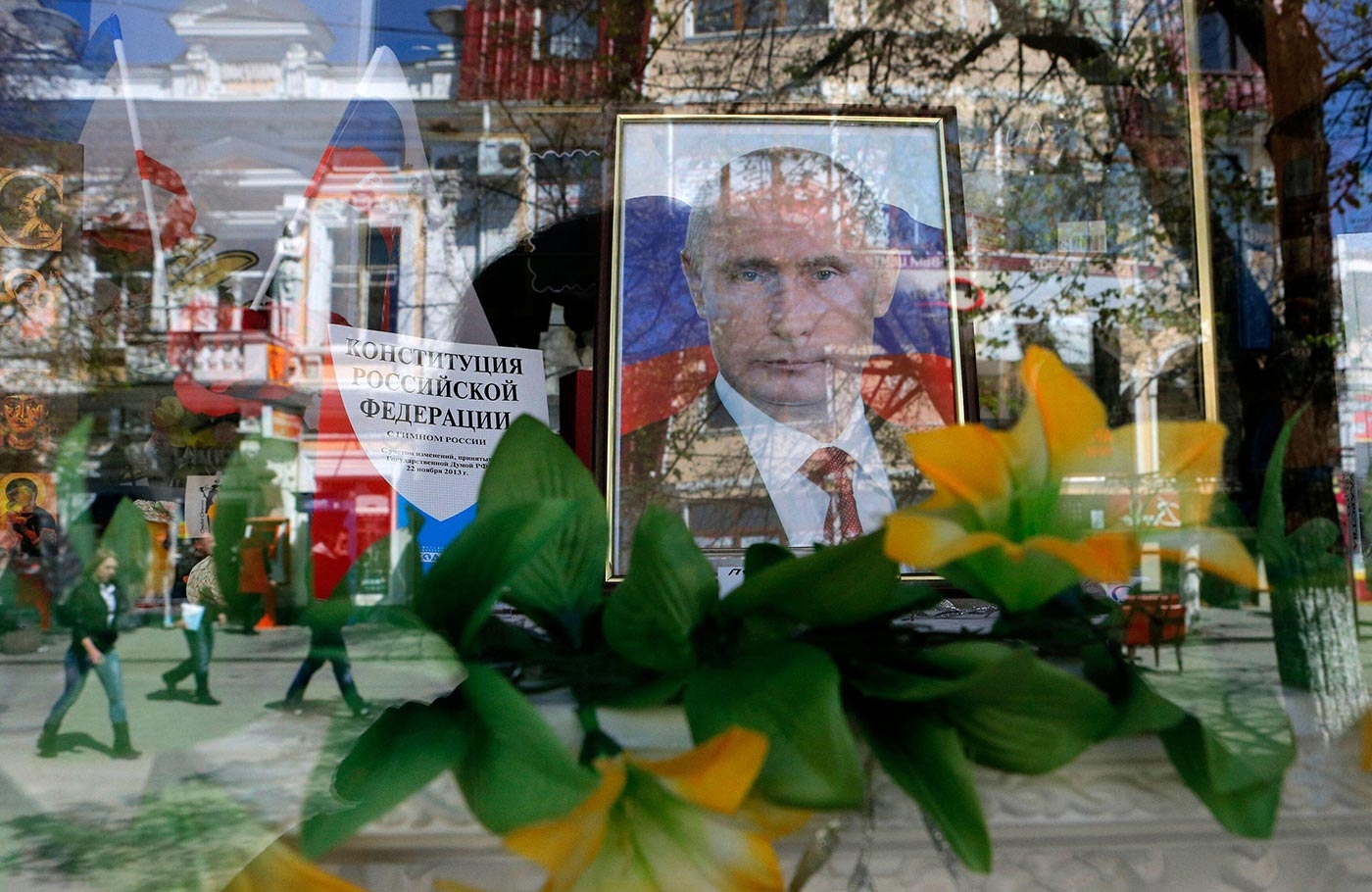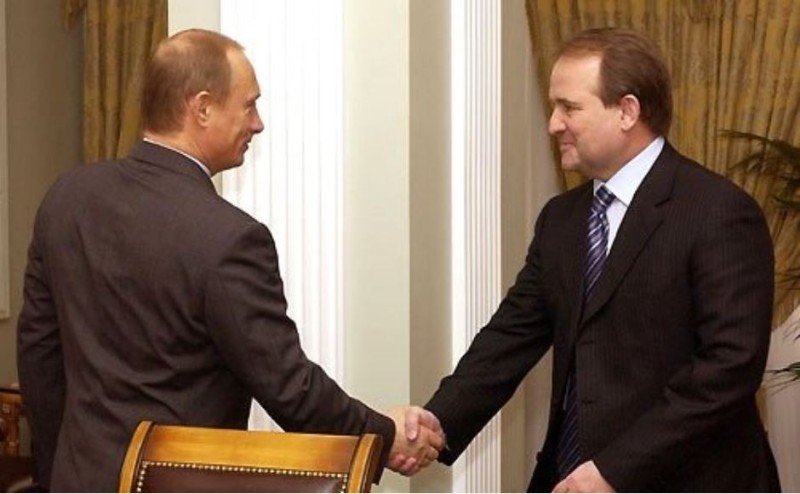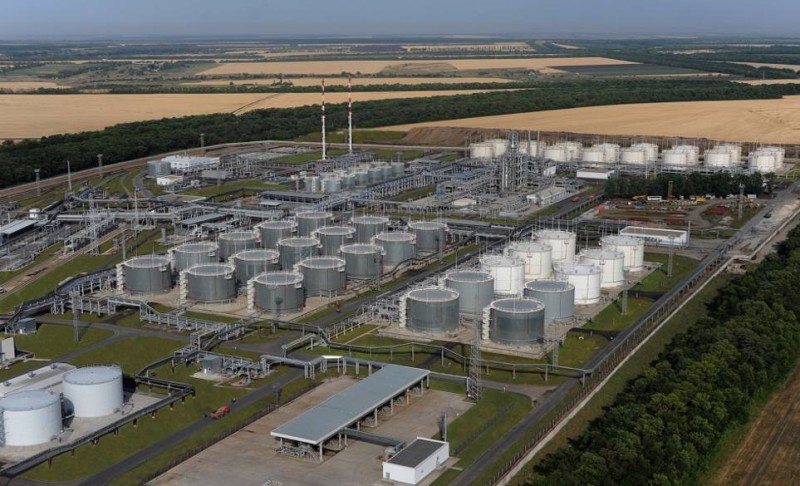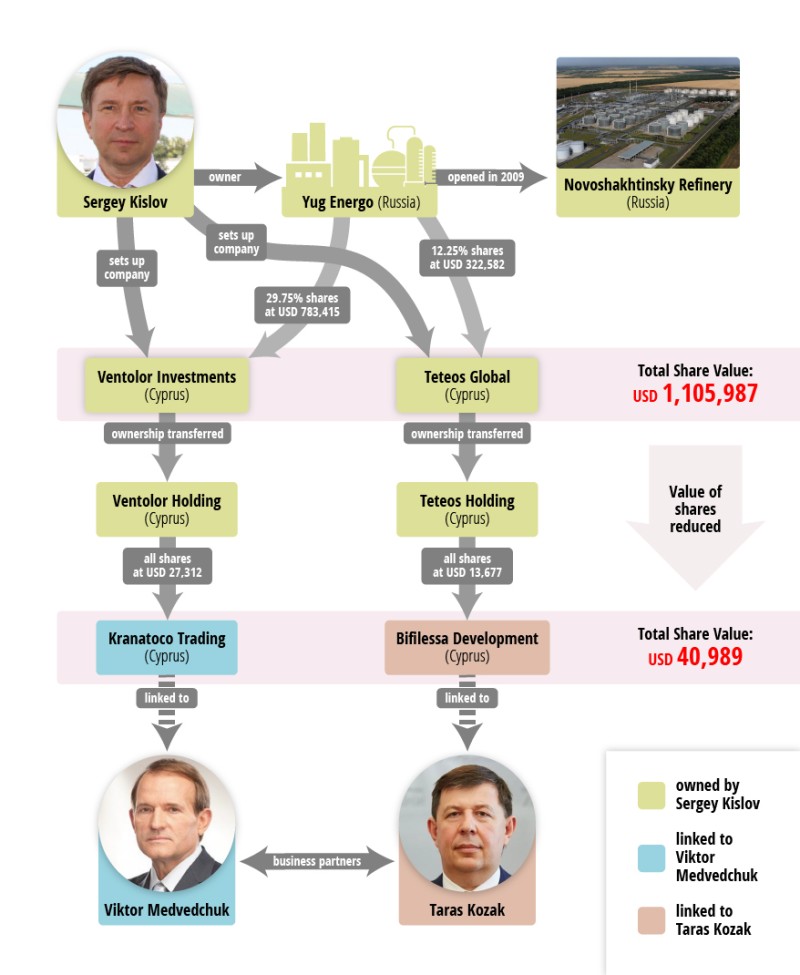In the early hours of February 27, 2014, dozens of gunmen in unmarked Russian military fatigues stormed the parliament of Ukraine’s Crimean peninsula, hoisted Russian flags, and stood guard as lawmakers voted to stage a referendum to break away and become part of Russia.
The arrival of the “little green men,” as they were called in Ukraine, marked a turning point in Russian President Vladimir Putin’s efforts to bring Ukraine to heel after protests toppled his ally President Viktor Yanukovych. But it was not the only event that would help cement Russian influence in Ukraine that day.
Half a continent away, in the sunny European offshore haven of Cyprus, a secretive deal was being struck: A large stake in Yug Energo, owner of a lucrative Russian oil refinery, was sold at bargain rates to companies linked to Ukraine’s leading pro-Russia opposition politician Viktor Medvedchuk and his longtime business partner, member of parliament Taras Kozak.
An investigation by the Ukrainian RFE/RL program Schemes and OCCRP has found that the companies linked to Medvedchuk and Kozak were able to secure a 42-percent stake in Yug Energo from Russian billionaire Sergey Kislov for barely more than $40,000 — a tiny fraction of what the men would make from the deal over the coming years.
The Yug Energo stake entitled Medvedchuk and Kozak to a large portion of the profits from the Novoshakhtinsky oil refinery, a half-billion-dollar facility completed a few years earlier in Russia’s southern Rostov region. These dividends would amount to tens of millions of dollars, bolstering Medvedchuk’s finances as he staged a political comeback and helped set up and finance Ukraine’s biggest pro-Russian political party, Opposition Platform — For Life.
In 2018, Medvedchuk and Kozak deepened their involvement in Yug Energo, increasing their combined stake to 93 percent. Schemes first revealed Medvedchuk’s connection to the refinery that same year. But the purchase price of the initial stake has never before been disclosed.
Reporters have also now uncovered another apparent Russian sweetheart deal dating to 2016, whereby companies controlled by both Medvedchuk and Kozak paid about $1,000 for a controlling interest in a company that holds rights to develop an almost one billion -barrel Russian oil field.
Both deals were carried out through a complex series of share transfers and loan agreements involving shell companies in Cyprus that appeared to make little business sense, said Graham Barrow, a UK-based financial crimes consultant who reviewed the documents. The companies involved often had confusingly similar names, with stakes changing hands for what appear to be far less than their real value, he added.
“There is no escaping that it looks like a valuable asset has changed hands and that, according to the documentation that you’ve seen and I’ve seen, the payment for that seems to be wildly disproportionate to the value that was transferred,” Barrow said.
Medvedchuk and Kozak did not reply to questions sent by reporters. Kislov’s company, Yug Rusi, also did not respond to questions.
When a reporter for Schemes attempted to ask Medvedchuk about the deal outside of parliament in early March, Medvedchuk walked away.
“Godfather” Putin
Medvedchuk, the deal’s main beneficiary, has a long history in Ukrainian politics and enjoys close personal ties to Russia’s leadership.
Putin has told Russian media that he first met Medvedchuk, who is now 66, in the early 2000s when Medvedchuk was serving as chief of staff for former Ukrainian President Leonid Kuchma. In 2004, Medvedchuk and his wife, Oksana Marchenko, honored Putin by making him godfather to their daughter, Daryna. Svetlana Medvedeva — the wife of former Russian President and Prime Minister Dmitry Medvedev — was named the girl’s godmother.
Following Ukraine’s 2004 Orange Revolution, which brought in a pro-European administration, Medvedchuk attempted to muster pro-Russian political forces into a parliamentary bloc, but they failed to win any seats in the 2006 elections. He surfaced again after Yanukovych came to power in 2010, running an organization that campaigned for closer economic ties with Russia.
Following Yanukovych’s overthrow in 2014, Medvedchuk was sanctioned by the U.S. for “violating Ukrainian sovereignty” and by Canada due to his alleged “political responsibility” for Ukraine’s crisis. He spent some time in the political wilderness before emerging once more as an opposition politician, still pushing to realign Ukraine with Moscow.
Medvedchuk’s business partner Kozak, who is often seen as Medvedchuk’s proxy, purchased the 112, Zik, and NewsOne television channels in 2018 and 2019 and promptly transformed them into pro-Russian outlets. He also became a key member of the newly created pro-Moscow party Opposition Platform — For Life, which won 44 seats in parliament the following year.
Both Medvedchuk and Kozak were sanctioned earlier this year by President Volodymyr Zelensky’s administration on suspicions of “financing terrorism,” a move Medvedchuk’s party said brought Ukraine “one step closer to becoming a dictatorship.” Their television channels were also taken off the air.

Eugene Magda, director of the Institute of World Policy (Ukraine) think tank, said that Medvedchuk appeared to be a “key instrument of influence” for Moscow in Ukraine and a “man whom Putin directly trusts.”
“Medvedchuk’s long-standing cooperation with the Kremlin shows that he is ready to defend Putin's interests... quite consistently,” Magda said.
Black Gold
Medvedchuk and Kozak’s control of the newly built Novoshakhtinsky refinery would prove highly lucrative.
The oil refinery was first opened in 2009 in Russia’s Rostov region by Sergey Kislov’s Yug Rusi holding company. Kislov, who made his fortune in agriculture, said in an interview at the time that it cost roughly 15 billion roubles ($500 million) to build.
The facility became the centerpiece of Kislov’s Yug Energo, which also owned subsidiaries used to ship and sell products from the refinery including diesel fuel, straight-run gasoline, and fuel oil. But the refinery almost immediately ran into trouble. Shortly after its launch, its operating license was reportedly suspended for safety violations by Russian regulators after then-Deputy Prime Minister Igor Sechin ordered a probe into a number of refineries. Sechin, a close Putin confidante, now heads state oil company Rosneft. The refinery also soon faced debt repayment demands from Russia’s majority-state-owned Sberbank, which financed about half the construction costs.
According to local media reports, Kislov was already looking for a buyer by 2011, citing difficulties competing with large state companies and major private-sector producers. Early potential buyers included a Russian state company, Zarubezhneft. But for unclear reasons, the deal never went through.
Despite its troubles, Yug Energo remained a solid earner. Company financial reports show the company was consistently in the black, earning $73 million in profits in 2013.
The profits did not stop Kislov from moving to offload the asset. By the end of 2013, he had initiated a series of opaque and complicated transactions between companies registered in Cyprus that ended with Medvedchuk and Kozak taking a large stake in the refinery.
In December 2013 — as protests against Yanukovych raged in Kyiv’s Maidan Nezalezhnosti square — Kislov set up two companies in Cyprus: Ventolor Investments on December 6, and Teteos Global on December 9. He then transferred a 42-percent stake in Yug Energo to these companies, saying that the shares had been pledged as collateral on a loan from another one of his companies. However, reporters were unable to find any documents proving the loan’s existence. Audit documents show that the shares were valued at just over $1.1 million.
Then, in January 2014, Kislov transferred the two companies’ shares to two other Cyprus shell firms with similar names: The shares of Ventolor Investments were transferred to a company called Ventolor Holding, while the Teteos Global shares were transferred to a company called Teteos Holding.
The handover to Medvedchuk and Kozak took place the following month. On February 27 — the day Crimean parliament was stormed — two Cyprus companies connected to Medvedchuk and Kozak, Kranatoco Trading and Bifilessa Development, took ownership of Ventolor Holding and Teteos Holding, respectively. Inexplicably, the value of the combined 42 percent share in Yug Energo was declared at just $40,989 — nearly 27 times less than they had been worth on the previous transfer.
For financial crimes analyst Barrow, such a deal makes no sense for a legitimate business transaction.
“Normally when you sell a business it’s done very straightforwardly: you have a seller and a buyer, and the buyer buys the shares for the value of the company,” he said. He pointed to how this sale had instead been completed through multiple offshore companies for diminishing returns for subsequent sales. “That doesn’t look like a sensible way of disposing of an asset” that was making tens of millions of dollars in profits, he said. “It’s a bit like giving your bank balance away for nothing.”
Wives and Proxies
A Sudden Bonanza
With 42 percent of Yug Energo now under their control, the companies linked to Medvedchuk and Kozak began raking in tens of millions of dollars in dividends.
Company audits show that Ventolor Investments, the company ultimately tied to Medvedchuk, received $31.77 million in dividends in 2014. Teteos Global, the company linked to Kozak, received $13.08 million over the same time period. In 2015, Ventolor received $8.93 million in dividends, while Teteos received $3.68 million. Neither company received dividends in 2016.
Documents after that date are patchy, but the information available indicates that the stakes have remained extremely lucrative. An audit of Teteos shows that the company earned 8.68 million euros ($9.8 million) in 2017. Audits for Ventolor are not available, but documents for Yug Energo show it paid out $80 million in dividends that year — meaning the share flowing to the Medvedchuk-linked company was likely just shy of $23.8 million.
Documents show that the shell companies boosted their combined stake in Yug Energo to 93 percent in February 2018. The details of this deal remain unclear.
Having profited mightily from a Russian oil refinery, Medvedchuk and Kozak also turned their sights on the state-owned Gavrikovsky oil field in the Khanty-Mansi region in the western Siberian plain — an asset also linked to Kislov.
In June 2015, Russia’s Federal Subsoil Resources Management Agency awarded the rights to develop the 136.7-million-ton field to NZNP Trade LLC, a company ultimately owned by Kislov’s Yug Energo and whose main previous function had been to sell products from the Novoshakhtinsky refinery.
The original tender conditions for the field had raised eyebrows at the time. A Rosneft subsidiary had been considered a leading contender. But, according to Russian business media outlets, authorities had made it a requirement that the winner would need to refine oil in Rostov, some 3,500 kilometers away from the deposits. Rosneft’s subsidiary even tried to sue the state institution behind the tender, but later simply recalled its tender application for unknown reasons.
The following year, the Ukrainians took majority control of NZNP Trade and its oil rights. Documents from Cyprus show that the Kozak-linked Teteos Holding acquired a 14.9-percent stake in NZNP Trade for just 202 euros ($224), while the Medvedchuk-linked Ventolor Holding obtained 50.1 percent of the company for $758.
There is no indication that the Gavrikovsky field is online yet. Company documents from 2019 show that the new owners invested just $177,800 in its development that year.
The Novoshakhtinsky refinery, meanwhile, is getting an upgrade. On March 12, a construction company connected to the refinery signed a deal to expand and modernize the facility for an estimated $2.5 billion.
The work, which is due to finish in 2030, will allow for the production of Euro-5 grade gasoline. It will also boost the refinery’s capacity by about 40 percent — and with it, almost certainly, the profits of its owners.
Aubrey Belford contributed reporting.
